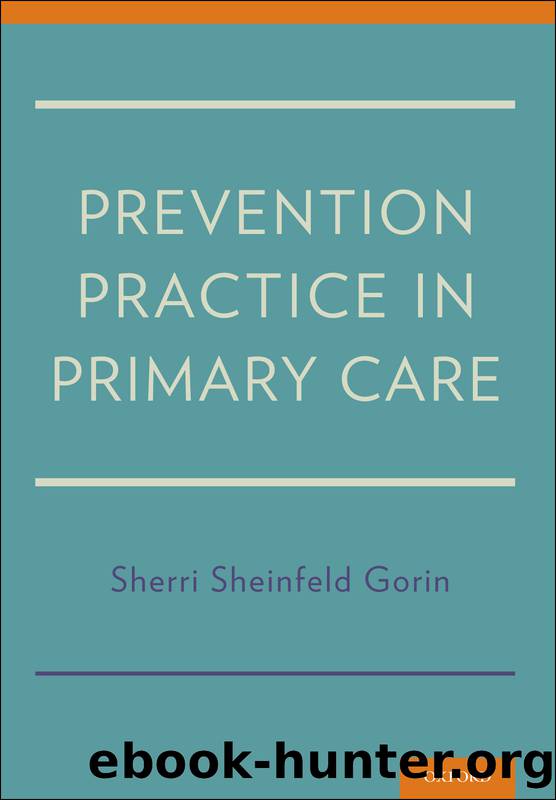Prevention Practice in Primary Care by Sheinfeld Gorin Sherri;

Author:Sheinfeld Gorin, Sherri;
Language: eng
Format: epub
Publisher: Oxford University Press, Incorporated
Published: 2014-08-15T00:00:00+00:00
Intra-cranial Atherosclerotic Artery Disease
Patients with symptomatic intracranial atherosclerosis have a high relative risk of recurrent stroke of about 20â25%. In the Extra-Cranial/Intra-Cranial (EC/IC) bypass study, patients with middle cerebral artery stenosis were randomized to surgical intervention and medical treatment with aspirin; no benefit was found for the surgical group (EC/IC, 1985). A newer clinical trial using more specific techniques to select patients with perfusion failure due to hemodynamic compromise was also negative (Powers et al., 2011).
In the recent Warfarin Aspirin Symptomatic Intracranial Disease (WASID) study, 569 patients with symptomatic intracranial stenosis were prospectively randomized to aspirin or warfarin, but the study was halted prematurely because of increased bleeding in the Warfarin arm and no difference between groups was detected for the end point of recurrent ischemic stroke. Importantly, this study demonstrated that patients with intracranial stenosis who fail anti-platelet therapy may be at higher risk of recurrent stroke (Chimowitz et al., 2005). However, it is unclear if warfarin and aspirin are equivalent in those who have âfailedâ anti-platelet therapy.
Endovascular management of intracranial stenosis by either angioplasty or stent, or both, provides an opportunity to rapidly improve cerebral blood flow in affected patients. Nevertheless, only a few large randomized prospective controlled trials have addressed this issue. Results from single-center studies suggest that these procedures can be achieved with a high level of technical success in those patients with recurrent symptoms despite optimal medical therapy. The Guidant-sponsored multicenter Stenting of Symptomatic Atherosclerotic lesions in the Vertebral or Intracranial Arteries (SSYLVIA) study was a prospective non-randomized feasibility study of stenting for the treatment of intracranial artery stenosis (SSYLVIA, 2004). In this study, 43 intracranial vessels and 18 extracranial vertebral arteries were treated. Successful stent deployment occurred in 95% of the cases. The 30-day stroke incidence was 6.6% with no deaths. Late (more than 30-day) stroke incidence was 7.3%. Recurrent stenosis occurred in 32% of intracranial vessels treated and 43% of those extracranial vessels treated.
In the recent Stenting versus Aggressive Medical Management for Preventing Recurrent Stroke in Intracranial Stenosis (SAMMPRIS) trial (Chimowitz et al., 2011), the investigators indicated that medical therapy was superior than stenting, which was associated with a higher risk of peri-procedural stroke or death. Moreover, the essential elements of the medical regimen used in this trial can readily be adopted in clinical practice.(Chimowitz et al., 2011).
Download
This site does not store any files on its server. We only index and link to content provided by other sites. Please contact the content providers to delete copyright contents if any and email us, we'll remove relevant links or contents immediately.
Introduction to Social Work Practice : A Practical Workbook by Herschel Knapp(263)
How Data Happened by Unknown(239)
Selective Oxidation Catalysts Obtained by the Immobilization of Iron (III) Porphyrins on Layered Hydroxide Salts by Fernando Wypych Shirley Nakagaki & Guilherme Sippel Machado(218)
Global Health Governance and Commercialisation of Public Health in India by Anuj Kapilashrami Rama V. Baru(190)
Unmasked by Emily Mendenhall(165)
Curing Cancerphobia by David Ropeik(150)
The Pandemic Divide by Gwendolyn L. Wright Lucas Hubbard and William A. Darity Jr(135)
Feminist Global Health Security by Clare Wenham(130)
FALSE PANDEMICS: ARGUMENTS AGAINST THE RULE OF FEAR by Wolfgang Wodarg(126)
Restoring Quality Health Care by Scott W. Atlas(124)
The Making of a Pandemic: Social, Political, and Psychological Perspectives on Covid-19 by John Ehrenreich(123)
Transforming Health Care Scheduling and Access: Getting to Now by Gary Kaplan(122)
Pandemic India by Arnold David;(122)
Oversight and Review of Clinical Gene Transfer Protocols: Assessing the Role of the Recombinant DNA Advisory Committee by Rebecca N. Koehler(119)
Risk Communication and Infectious Diseases in an Age of Digital Media by Anat Gesser-Edelsburg Yaffa Shir-Raz(108)
Insane Society: A Sociology of Mental Health by Peter Morrall(108)
Into Africa, Out of Academia by Kwan Kew Lai(106)
Psychosocial Interventions for Mental and Substance Use Disorders: A Framework for Establishing Evidence-Based Standards by Mary Jane England(106)
The Metropolitan Academic Medical Center by David E. Rogers Eli Ginzberg(105)
